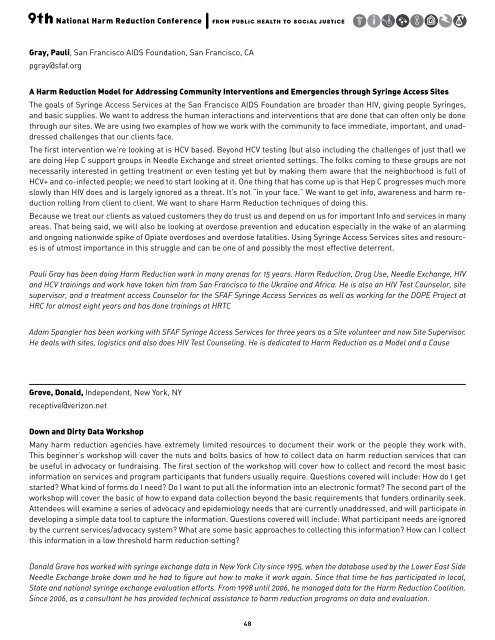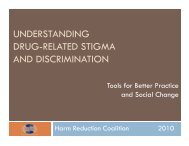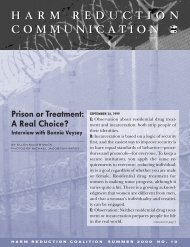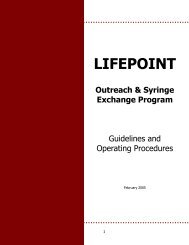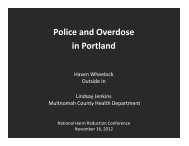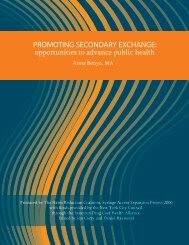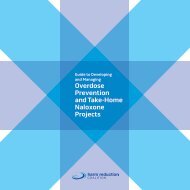9th - Harm Reduction Coalition
9th - Harm Reduction Coalition
9th - Harm Reduction Coalition
You also want an ePaper? Increase the reach of your titles
YUMPU automatically turns print PDFs into web optimized ePapers that Google loves.
<strong>9th</strong><br />
National <strong>Harm</strong> <strong>Reduction</strong> Conference<br />
FROM PUBLIC HEALTH TO SOCIAL JUSTICE<br />
Gray, Pauli, San Francisco AIDS Foundation, San Francisco, CA<br />
pgray@sfaf.org<br />
A <strong>Harm</strong> <strong>Reduction</strong> Model for Addressing Community Interventions and Emergencies through Syringe Access Sites<br />
The goals of Syringe Access Services at the San Francisco AIDS Foundation are broader than HIV, giving people Syringes,<br />
and basic supplies. We want to address the human interactions and interventions that are done that can often only be done<br />
through our sites. We are using two examples of how we work with the community to face immediate, important, and unaddressed<br />
challenges that our clients face.<br />
The first intervention we’re looking at is HCV based. Beyond HCV testing (but also including the challenges of just that) we<br />
are doing Hep C support groups in Needle Exchange and street oriented settings. The folks coming to these groups are not<br />
necessarily interested in getting treatment or even testing yet but by making them aware that the neighborhood is full of<br />
HCV+ and co-infected people; we need to start looking at it. One thing that has come up is that Hep C progresses much more<br />
slowly than HIV does and is largely ignored as a threat. It’s not “in your face.” We want to get info, awareness and harm reduction<br />
rolling from client to client. We want to share <strong>Harm</strong> <strong>Reduction</strong> techniques of doing this.<br />
Because we treat our clients as valued customers they do trust us and depend on us for important Info and services in many<br />
areas. That being said, we will also be looking at overdose prevention and education especially in the wake of an alarming<br />
and ongoing nationwide spike of Opiate overdoses and overdose fatalities. Using Syringe Access Services sites and resources<br />
is of utmost importance in this struggle and can be one of and possibly the most effective deterrent.<br />
Pauli Gray has been doing <strong>Harm</strong> <strong>Reduction</strong> work in many arenas for 15 years. <strong>Harm</strong> <strong>Reduction</strong>, Drug Use, Needle Exchange, HIV<br />
and HCV trainings and work have taken him from San Francisco to the Ukraine and Africa. He is also an HIV Test Counselor, site<br />
supervisor, and a treatment access Counselor for the SFAF Syringe Access Services as well as working for the DOPE Project at<br />
HRC for almost eight years and has done trainings at HRTC<br />
Adam Spangler has been working with SFAF Syringe Access Services for three years as a Site volunteer and now Site Supervisor.<br />
He deals with sites, logistics and also does HIV Test Counseling. He is dedicated to <strong>Harm</strong> <strong>Reduction</strong> as a Model and a Cause<br />
Grove, Donald, Independent, New York, NY<br />
receptive@verizon.net<br />
Down and Dirty Data Workshop<br />
Many harm reduction agencies have extremely limited resources to document their work or the people they work with.<br />
This beginner’s workshop will cover the nuts and bolts basics of how to collect data on harm reduction services that can<br />
be useful in advocacy or fundraising. The first section of the workshop will cover how to collect and record the most basic<br />
information on services and program participants that funders usually require. Questions covered will include: How do I get<br />
started What kind of forms do I need Do I want to put all the information into an electronic format The second part of the<br />
workshop will cover the basic of how to expand data collection beyond the basic requirements that funders ordinarily seek.<br />
Attendees will examine a series of advocacy and epidemiology needs that are currently unaddressed, and will participate in<br />
developing a simple data tool to capture the information. Questions covered will include: What participant needs are ignored<br />
by the current services/advocacy system What are some basic approaches to collecting this information How can I collect<br />
this information in a low threshold harm reduction setting<br />
Donald Grove has worked with syringe exchange data in New York City since 1995, when the database used by the Lower East Side<br />
Needle Exchange broke down and he had to figure out how to make it work again. Since that time he has participated in local,<br />
State and national syringe exchange evaluation efforts. From 1998 until 2006, he managed data for the <strong>Harm</strong> <strong>Reduction</strong> <strong>Coalition</strong>.<br />
Since 2006, as a consultant he has provided technical assistance to harm reduction programs on data and evaluation.<br />
48


